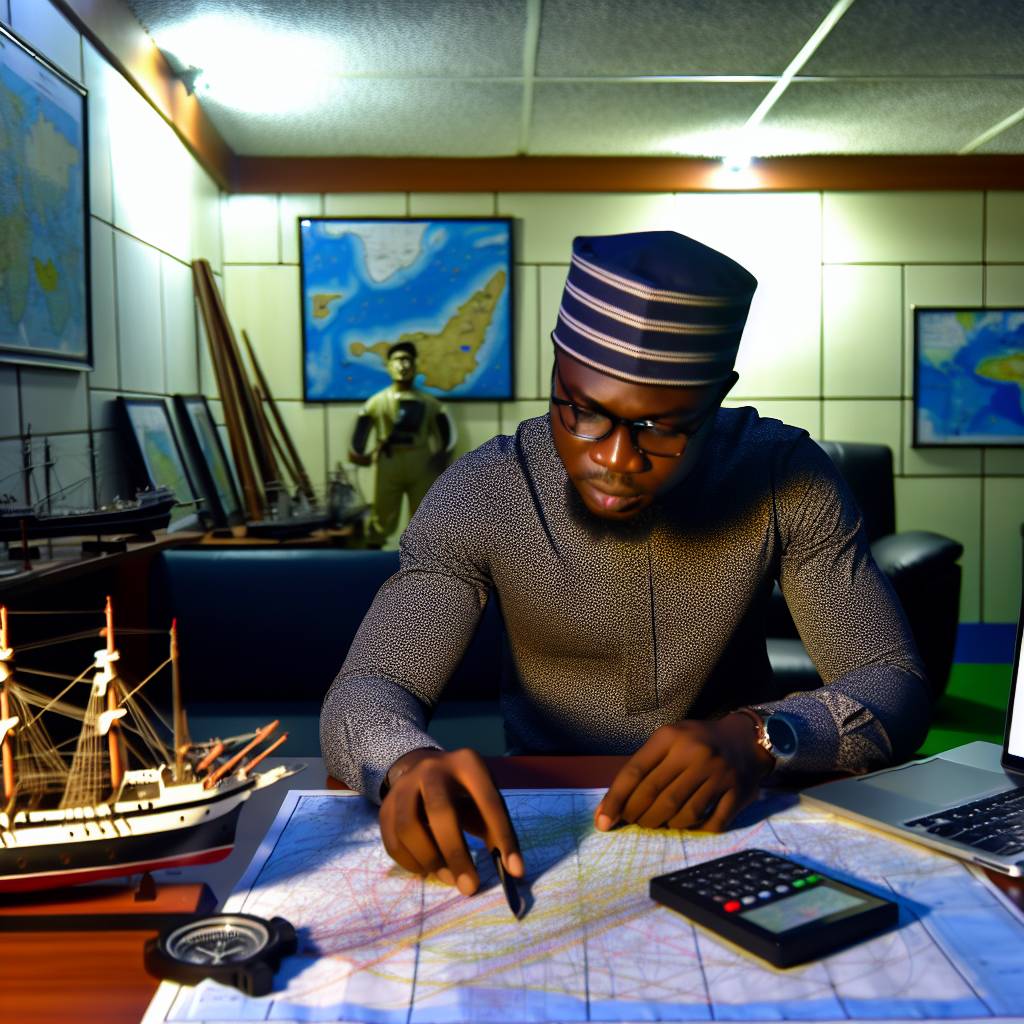Introduction
Marine engineering involves the design, construction, and maintenance of ships and other waterborne vessels.
It plays a crucial role in ensuring the efficiency and safety of maritime operations.
In Nigeria, marine engineering is essential for the growth and development of the maritime sector.
It encompasses various aspects such as naval architecture, ship design, and offshore engineering.
History and Evolution
Marine engineering has a rich history in Nigeria, dating back to the colonial era when the country was under British rule.
During this period, ships were mainly used for transportation and trade along the coastal regions.
As Nigeria gained independence in 1960, there was a growing need for the country to establish its maritime industry.
This led to the development of local shipbuilding and repair facilities, which further highlighted the importance of marine engineering.
Over the years, Nigeria has made significant progress in the field of marine engineering, with the establishment of institutions offering specialized training in naval architecture and marine engineering.
This has helped to create a pool of skilled professionals who are contributing to the growth of the maritime sector.
Today, marine engineering continues to be a critical component of Nigeria’s maritime sector.
The country seeks to bolster its maritime capabilities and expand its presence in the global shipping industry.
Responsibilities of Marine Engineers in the Maritime Sector
Marine engineers in Nigeria play a crucial role in ensuring the smooth operation of vessels.
They are responsible for the maintenance of ship engines and overall safety at sea.
These professionals design, construct, and maintain ships.
They also oversee the installation of propulsion systems and other mechanical equipment on board.
Marine engineers conduct regular inspections and tests to ensure proper functioning.
They ensure compliance with industry regulations as well.
These engineers play a key role in troubleshooting and repairing issues during vessel operation.
This work ensures the safety of crew members and cargo.
Contributions of Marine Engineers to the Economy and Infrastructure Development
Marine engineers contribute significantly to Nigeria’s economy by supporting the maritime sector.
The maritime sector plays a crucial role in international trade and transportation.
Engineers ensure the efficient and cost-effective movement of goods across waterways.
This facilitates economic growth and development in Nigeria.
Furthermore, marine engineers are instrumental in developing infrastructure related to ports.
They also work on harbors and shipping terminals to improve efficiency and safety.
These efforts ultimately benefit the entire economy.
Challenges and Opportunities Facing Marine Engineers in Nigeria
Despite their important role, marine engineers in Nigeria face several challenges.
Challenges include inadequate training and education, limiting their effectiveness.
Access to modern technology and equipment is also limited.
Inadequate funding for research and development further impacts their work.
However, opportunities exist for marine engineers to thrive in Nigeria.
Advancements in technology create a growing demand for transportation services.
Skilled professionals can adapt to new technologies and contribute to solutions.
The maritime industry is dynamic and rewarding for marine engineers.
Education and Training for Marine Engineers
Marine engineering is a specialized field that requires a combination of academic knowledge and practical skills.
To become a marine engineer, individuals need to undergo rigorous training and education in various aspects of engineering, mechanics, and naval architecture.
To begin a career in marine engineering, individuals typically need to have a bachelor’s degree in marine engineering or a related field.
This degree program covers topics such as marine propulsion systems, ship design, marine machinery, and marine structures.
Additionally, marine engineers are required to have a strong background in mathematics, physics, and computer-aided design (CAD) software.
Transform Your Career with Expert Guidance
Get personalized mentorship consulting that’s tailored to your unique path. Our expert advice is actionable and exclusive.
Get StartedIn addition to a formal degree, aspiring marine engineers may also need to obtain professional certifications and licenses.
These credentials vary depending on the specific job requirements and industry regulations.
For example, marine engineers working on commercial vessels may need to hold a Merchant Marine Credential issued by the U.S. Coast Guard.
Institutions in Nigeria Offering Marine Engineering Programs
In Nigeria, there are several institutions that offer marine engineering programs to aspiring students.
Some of the prominent universities and colleges include:
- Federal University of Petroleum Resources, Effurun
- Nigerian Defence Academy, Kaduna
- Maritime Academy of Nigeria, Oron
These institutions provide a comprehensive curriculum that covers both theoretical knowledge and hands-on training in marine engineering principles.
Students enrolled in these programs have the opportunity to work with state-of-the-art equipment and facilities, gaining practical experience in ship design, marine propulsion systems, and marine technology.
Importance of Continuous Learning and Professional Development for Marine Engineers
Continuous learning and professional development are crucial for marine engineers to stay abreast of the latest industry trends and technological advancements.
As the maritime sector evolves, marine engineers need to upgrade their skills and knowledge to remain competitive in the field.
One of the key benefits of continuous learning is the ability to adapt to changes in regulations and industry standards.
By participating in training programs and workshops, marine engineers can ensure that they are up-to-date on the latest safety protocols, environmental regulations, and emerging technologies.
Furthermore, continuous learning allows marine engineers to expand their expertise and pursue specialized career paths within the maritime sector.
Whether it’s pursuing advanced certifications in marine propulsion systems or specializing in offshore oil and gas exploration, ongoing professional development can open up new opportunities for career growth and advancement.
Education and training play a vital role in shaping the careers of marine engineers in Nigeria.
By obtaining the necessary qualifications, staying current on industry trends, and investing in continuous learning, marine engineers can build successful and rewarding careers in the maritime sector.
Find Out More: Career Paths in Networking & System Security in Nigeria
Technological Advancements in Marine Engineering
The field of marine engineering in Nigeria has seen significant advancements in technology over the years.
These technological innovations have had a major impact on how ships are designed.
The propulsion systems they use and the navigation tools that make their operations smoother and more efficient.
Impact of technology on the field of marine engineering in Nigeria
Technology has revolutionized the way marine engineering is practiced in Nigeria.
With the introduction of advanced software and computer-aided design tools, engineers are now able to create more complex and efficient ship designs.
These tools allow for better analysis of structural integrity, stability, and performance of vessels.
This leads to safer and more reliable ships.
Furthermore, advancements in communication technology have enhanced the connectivity of ships at sea.
This allows for real-time monitoring and control of vessel operations.
This has increased safety measures and efficiency in the maritime industry.
Ultimately, it improves the overall performance of Nigeria’s maritime sector.
Innovations in ship design, propulsion systems, and navigation tools
One of the key areas where technology has had a significant impact is in ship design.
Innovations such as 3D modeling, virtual reality simulations, and advanced materials have led to the development of lighter, faster, and more fuel-efficient vessels.
These modern ships are able to carry larger cargo loads while consuming less fuel.
This makes them environmentally friendly and cost-effective.
Propulsion systems have also seen significant advancements.
With the introduction of more efficient engines and alternative fuel sources, the use of hybrid and electric propulsion systems is becoming more common.
This reduces emissions and makes ships more sustainable in Nigeria’s maritime sector.
Navigation tools have also benefited from technological advancements.
With the integration of GPS, radar, and satellite communication systems, these tools provide accurate and real-time information to ship operators.
This allows for better route planning, collision avoidance, and overall safety at sea.
Opportunities for collaboration and partnerships with global leaders in marine engineering
With the rapid evolution of technology in the field of marine engineering, there are numerous opportunities for collaboration and partnerships with global leaders in the industry.
Nigeria can benefit from knowledge exchange, technology transfer, and joint research projects with established marine engineering firms from around the world.
By fostering partnerships with global leaders, Nigeria can gain access to cutting-edge technologies, best practices, and expertise in marine engineering.
This collaboration can help accelerate the development of the country’s maritime sector.
It can also improve infrastructure and enhance its competitive edge in the global market.
Technological advancements in marine engineering have played a crucial role in shaping Nigeria’s maritime sector.
By embracing innovation, collaborating with global leaders, and adopting the latest technologies, Nigeria can continue to strengthen its position as a key player in the maritime industry.
Gain More Insights: How to Choose a Land Surveying Firm in Nigeria
Regulation and Compliance in the Maritime Sector
Overview of regulations governing marine engineering in Nigeria.
Nigeria’s maritime sector is governed by various regulations to ensure safety, security, and sustainability.
The Nigerian Maritime Administration and Safety Agency (NIMASA) is the key regulatory body responsible for overseeing the implementation of these regulations.
Some of the key regulations governing marine engineering in Nigeria include the Merchant Shipping Act, the Nigerian Ports Authority Act, and the Nigerian Maritime Administration and Safety Agency Act.
These regulations cover a wide range of issues, including vessel registration, crew certification, safety standards, environmental protection, and port operations.
Importance of adherence to international standards and best practices.
Adherence to international standards and best practices is crucial in the maritime sector to ensure that vessels, ports, and offshore installations meet the highest safety and environmental standards.
By aligning with international best practices, Nigeria can enhance its reputation as a reliable and responsible maritime nation, attracting more international trade and investment.
Compliance with international standards also helps improve safety, security, and sustainability in the maritime sector, reducing the risk of accidents, pollution, and other negative impacts.
Role of regulatory bodies and agencies in ensuring safety and sustainability in the maritime sector.
- Regulatory bodies like NIMASA play a crucial role in ensuring safety and sustainability in the maritime sector by enforcing regulations, conducting inspections, and providing guidance to industry stakeholders.
- These regulatory bodies work closely with other government agencies, industry associations, and international organizations to develop and implement effective regulatory frameworks that promote safety, security, and environmental protection.
- Through oversight and enforcement activities, regulatory bodies help prevent accidents, mitigate risks, and improve compliance with international standards, ultimately enhancing the overall safety and sustainability of the maritime sector.
- By monitoring and regulating maritime activities, these bodies help create a level playing field for industry players, promote fair competition, and protect the interests of all stakeholders, including workers, passengers, and the environment.
Discover More: Agricultural Waste Management: Engineering Solutions

Economic Impact of Marine Engineering in Nigeria
Marine engineering plays a crucial role in shaping the economic landscape of Nigeria.
The maritime sector contributes significantly to the country’s GDP.
It creates job opportunities and fosters career growth for marine engineers.
Contribution of the Maritime Sector to the Nigerian Economy
- The maritime sector is a vital component of Nigeria’s economy, accounting for a significant portion of the country’s GDP.
- Marine engineering activities, such as shipbuilding, repair, and maintenance, contribute to the overall economic development of Nigeria.
- The sector facilitates international trade, allowing for the import and export of goods, which boosts economic growth and stability.
- Maritime transportation is a cost-effective and efficient mode of transporting goods, which benefits various industries and businesses in Nigeria.
Job Opportunities and Career Prospects for Marine Engineers in Nigeria
- Marine engineering offers diverse career prospects for individuals interested in the field, with opportunities in ship design, construction, and operation.
- There is a high demand for skilled marine engineers in Nigeria, with job openings in both government and private sectors.
- Marine engineers have the opportunity to work in various roles, including marine surveyors, naval architects, and offshore oil rig engineers.
- The sector provides competitive salaries and benefits, making it an attractive career choice for young professionals in Nigeria.
Potential for Growth and Expansion in the Marine Engineering Industry
- The marine engineering industry in Nigeria has significant potential for growth and expansion, driven by increasing demand for shipping services and infrastructure development.
- With advancements in technology and innovation, the sector is poised for further growth, offering opportunities for investment and job creation.
- Nigeria’s strategic geographic location and coastline provide a competitive advantage for the marine engineering industry, attracting foreign investments and partnerships.
- The government’s support for the sector through policies and regulations further enhances the growth prospects of marine engineering in Nigeria.
You Might Also Like: Women in Nigerian Structural Engineering: Breaking Barriers
Significance of Marine Engineering in Nigeria
Marine engineering plays a critical role in Nigeria’s maritime sector.
It ensures the efficient operation of vessels, infrastructure, and offshore installations.
Emphasizing the significance of marine engineering in Nigeria cannot be overstated.
It drives the country’s economy through trade, transportation, and offshore exploration.
Aspiring marine engineers and stakeholders must collaborate to enhance the sustainable development of Nigeria’s maritime sector.
With innovative solutions and teamwork, the sector can reach greater heights and contribute significantly to the nation’s growth.
Additional Resources
William Jame – Marine Engineering And Research Institute
Centre Of Excellence In Marine And Offshore Engineering – Rivers …




